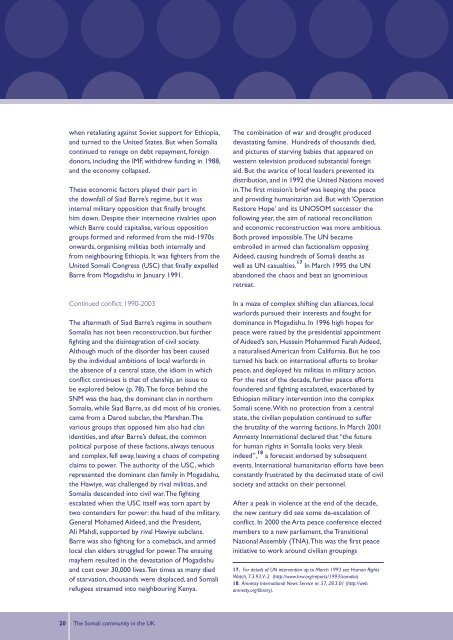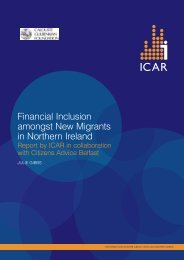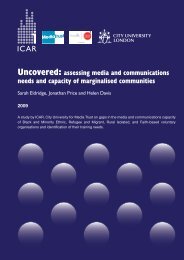The Somali community in the UK: What we know and how we ... - ICAR
The Somali community in the UK: What we know and how we ... - ICAR
The Somali community in the UK: What we know and how we ... - ICAR
Create successful ePaper yourself
Turn your PDF publications into a flip-book with our unique Google optimized e-Paper software.
when retaliat<strong>in</strong>g aga<strong>in</strong>st Soviet support for Ethiopia,<br />
<strong>and</strong> turned to <strong>the</strong> United States. But when <strong>Somali</strong>a<br />
cont<strong>in</strong>ued to renege on debt repayment, foreign<br />
donors, <strong>in</strong>clud<strong>in</strong>g <strong>the</strong> IMF, withdrew fund<strong>in</strong>g <strong>in</strong> 1988,<br />
<strong>and</strong> <strong>the</strong> economy collapsed.<br />
<strong>The</strong>se economic factors played <strong>the</strong>ir part <strong>in</strong><br />
<strong>the</strong> downfall of Siad Barre’s regime, but it was<br />
<strong>in</strong>ternal military opposition that f<strong>in</strong>ally brought<br />
him down. Despite <strong>the</strong>ir <strong>in</strong>ternec<strong>in</strong>e rivalries upon<br />
which Barre could capitalise, various opposition<br />
groups formed <strong>and</strong> reformed from <strong>the</strong> mid-1970s<br />
onwards, organis<strong>in</strong>g militias both <strong>in</strong>ternally <strong>and</strong><br />
from neighbour<strong>in</strong>g Ethiopia. It was fighters from <strong>the</strong><br />
United <strong>Somali</strong> Congress (USC) that f<strong>in</strong>ally expelled<br />
Barre from Mogadishu <strong>in</strong> January 1991.<br />
Cont<strong>in</strong>ued conflict: 1990-2003<br />
<strong>The</strong> aftermath of Siad Barre’s regime <strong>in</strong> sou<strong>the</strong>rn<br />
<strong>Somali</strong>a has not been reconstruction, but fur<strong>the</strong>r<br />
fight<strong>in</strong>g <strong>and</strong> <strong>the</strong> dis<strong>in</strong>tegration of civil society.<br />
Although much of <strong>the</strong> disorder has been caused<br />
by <strong>the</strong> <strong>in</strong>dividual ambitions of local warlords <strong>in</strong><br />
<strong>the</strong> absence of a central state, <strong>the</strong> idiom <strong>in</strong> which<br />
conflict cont<strong>in</strong>ues is that of clanship, an issue to<br />
be explored below (p. 78). <strong>The</strong> force beh<strong>in</strong>d <strong>the</strong><br />
SNM was <strong>the</strong> Isaq, <strong>the</strong> dom<strong>in</strong>ant clan <strong>in</strong> nor<strong>the</strong>rn<br />
<strong>Somali</strong>a, while Siad Barre, as did most of his cronies,<br />
came from a Darod subclan, <strong>the</strong> Marehan. <strong>The</strong><br />
various groups that opposed him also had clan<br />
identities, <strong>and</strong> after Barre’s defeat, <strong>the</strong> common<br />
political purpose of <strong>the</strong>se factions, always tenuous<br />
<strong>and</strong> complex, fell away, leav<strong>in</strong>g a chaos of compet<strong>in</strong>g<br />
claims to po<strong>we</strong>r. <strong>The</strong> authority of <strong>the</strong> USC, which<br />
represented <strong>the</strong> dom<strong>in</strong>ant clan family <strong>in</strong> Mogadishu,<br />
<strong>the</strong> Hawiye, was challenged by rival militias, <strong>and</strong><br />
<strong>Somali</strong>a descended <strong>in</strong>to civil war. <strong>The</strong> fight<strong>in</strong>g<br />
escalated when <strong>the</strong> USC itself was torn apart by<br />
two contenders for po<strong>we</strong>r: <strong>the</strong> head of <strong>the</strong> military,<br />
General Mohamed Aideed, <strong>and</strong> <strong>the</strong> President,<br />
Ali Mahdi, supported by rival Hawiye subclans.<br />
Barre was also fight<strong>in</strong>g for a comeback, <strong>and</strong> armed<br />
local clan elders struggled for po<strong>we</strong>r. <strong>The</strong> ensu<strong>in</strong>g<br />
mayhem resulted <strong>in</strong> <strong>the</strong> devastation of Mogadishu<br />
<strong>and</strong> cost over 30,000 lives. Ten times as many died<br />
of starvation, thous<strong>and</strong>s <strong>we</strong>re displaced, <strong>and</strong> <strong>Somali</strong><br />
refugees streamed <strong>in</strong>to neighbour<strong>in</strong>g Kenya.<br />
<strong>The</strong> comb<strong>in</strong>ation of war <strong>and</strong> drought produced<br />
devastat<strong>in</strong>g fam<strong>in</strong>e. Hundreds of thous<strong>and</strong>s died,<br />
<strong>and</strong> pictures of starv<strong>in</strong>g babies that appeared on<br />
<strong>we</strong>stern television produced substantial foreign<br />
aid. But <strong>the</strong> avarice of local leaders prevented its<br />
distribution, <strong>and</strong> <strong>in</strong> 1992 <strong>the</strong> United Nations moved<br />
<strong>in</strong>. <strong>The</strong> first mission’s brief was keep<strong>in</strong>g <strong>the</strong> peace<br />
<strong>and</strong> provid<strong>in</strong>g humanitarian aid. But with ‘Operation<br />
Restore Hope’ <strong>and</strong> its UNOSOM successor <strong>the</strong><br />
follow<strong>in</strong>g year, <strong>the</strong> aim of national reconciliation<br />
<strong>and</strong> economic reconstruction was more ambitious.<br />
Both proved impossible. <strong>The</strong> UN became<br />
embroiled <strong>in</strong> armed clan factionalism oppos<strong>in</strong>g<br />
Aideed, caus<strong>in</strong>g hundreds of <strong>Somali</strong> deaths as<br />
<strong>we</strong>ll as UN casualties. 17 In March 1995 <strong>the</strong> UN<br />
ab<strong>and</strong>oned <strong>the</strong> chaos <strong>and</strong> beat an ignom<strong>in</strong>ious<br />
retreat.<br />
In a maze of complex shift<strong>in</strong>g clan alliances, local<br />
warlords pursued <strong>the</strong>ir <strong>in</strong>terests <strong>and</strong> fought for<br />
dom<strong>in</strong>ance <strong>in</strong> Mogadishu. In 1996 high hopes for<br />
peace <strong>we</strong>re raised by <strong>the</strong> presidential appo<strong>in</strong>tment<br />
of Aideed’s son, Husse<strong>in</strong> Mohammed Farah Aideed,<br />
a naturalised American from California. But he too<br />
turned his back on <strong>in</strong>ternational efforts to broker<br />
peace, <strong>and</strong> deployed his militias <strong>in</strong> military action.<br />
For <strong>the</strong> rest of <strong>the</strong> decade, fur<strong>the</strong>r peace efforts<br />
foundered <strong>and</strong> fight<strong>in</strong>g escalated, exacerbated by<br />
Ethiopian military <strong>in</strong>tervention <strong>in</strong>to <strong>the</strong> complex<br />
<strong>Somali</strong> scene. With no protection from a central<br />
state, <strong>the</strong> civilian population cont<strong>in</strong>ued to suffer<br />
<strong>the</strong> brutality of <strong>the</strong> warr<strong>in</strong>g factions. In March 2001<br />
Amnesty International declared that “<strong>the</strong> future<br />
for human rights <strong>in</strong> <strong>Somali</strong>a looks very bleak<br />
<strong>in</strong>deed”, 18 a forecast endorsed by subsequent<br />
events. International humanitarian efforts have been<br />
constantly frustrated by <strong>the</strong> decimated state of civil<br />
society <strong>and</strong> attacks on <strong>the</strong>ir personnel.<br />
After a peak <strong>in</strong> violence at <strong>the</strong> end of <strong>the</strong> decade,<br />
<strong>the</strong> new century did see some de-escalation of<br />
conflict. In 2000 <strong>the</strong> Arta peace conference elected<br />
members to a new parliament, <strong>the</strong> Transitional<br />
National Assembly (TNA). This was <strong>the</strong> first peace<br />
<strong>in</strong>itiative to work around civilian group<strong>in</strong>gs<br />
17. For details of UN <strong>in</strong>tervention up to March 1993 see Human Rights<br />
Watch, 7.3.93.V: 2 (http://www.hrw.org/reports/1993/somalia).<br />
18. Amnesty International News Service nr. 57, 28.3.01 (http://<strong>we</strong>b.<br />
amnesty.org/library).<br />
20 <strong>The</strong> <strong>Somali</strong> <strong>community</strong> <strong>in</strong> <strong>the</strong> <strong>UK</strong>

















